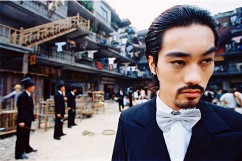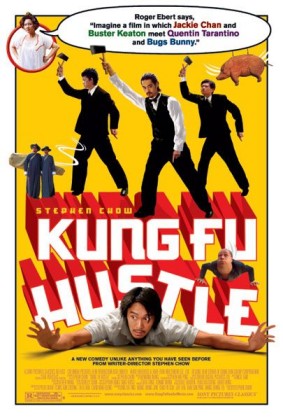|
Kung
Fu Hustle
Picture, if you will, a desolate wide-angle shot on Pig
Sty Alley, a ghetto whose name speaks volumes for its state
of being. In the foreground, two children juggle a soccer
ball back and forth between them until the ball rolls errantly
towards the camera. A voice booms from off-screen.
“No
more soccer.”
A foot
slams down onto the soccer ball, comically deflating it
to the dismay of the children. It’s with said emphatic
gusto that Stephen Chow makes his entrance in his new film
Kung Fu Hustle, and one can hardly dismiss the
resounding nature of such a statement. Chow was poised to
storm the US with his last effort, Shaolin Soccer,
when the film sat for years on the Miramax shelves collecting
dust. The film grew in popularity through bootlegs and imported
DVDs, so much so that by the time news of the film’s
domestic release was first teased, fans in the US were outraged
to hear that the film had not only undergone re-editing,
but had also been sentenced to a fate worse than death.
That’s right, it was re-dubbed in English, of all
things.
Obviously,
Miramax was unsure how the film would be embraced stateside,
which was likely the impetus for the delays and massive
re-working. Eventually, Miramax reconsidered and the re-edited
version of the film was quietly slipped into theaters, un-dubbed.
What was once the “highest grossing Hong Kong made
film in Hong Kong” had made less than a whisper in
the states, and undoubtedly Chow grew tired of the hullabaloo.
Which
is likely the reason for his characters entrance in Kung
Fu Hustle, a film so steeped in genius comedic genre
play that it walks the fine line between brilliance and
absurdity. From its opening sequence, depicting a group
of 50’s era toughies dubbed “The Crocodile Gang”
flexing their power with the local “Crime Busters”
before getting cornered by their rivals, “The Axe
Gang” in the streets. What ensues is a cross between
the “Smith Virus” showdown in The Matrix: Revolutions
and Gangs of New York, a full fledge brawl and an outright
shifting of the power paradigm. The Axe Gang wields, as
you may have guessed, axes so razor sharp that they cleave
limbs with the greatest of ease. The Crocodile Gang never
gets the chance to unleash their crocodiles, but I’m
sure it would have been an interesting sight to see.
 |
The
film quickly shifts to Pig Sty Alley, where its inhabitants
must do the best that they can to pay rent while suffering
the rage of their landlords, a pair of lovers with extraordinary
powers to rival their skills at hurling barbs and insults
at one another. Chow deftly peppers the film, especially
the Pig Sty Alley sequences, with enough insight to bring
depth to an otherwise irreverent film. His astute fixation
with labor practices is reminiscent of Martin Scorsese’s
own attention to details in regards to everything from the
stitching of gangsters’ suits in Good Fellas to the
minutiae of spaghetti sauce preparation in Italianamerican.
Its insight such as this that makes the rest of the film
much more weighty than it should, considering that it features
characters whose legs mirror those of the Roadrunner while
being chased by Wile E. Coyote.
Sing
(Chow) arrives in Pig Sty Alley with dreams of grifting.
He plans to usurp cash through intimidation, and his method
is that of impersonation. Chow has been likened to Buster
Keaton and Charlie Chaplin, and both accounts are right
on. However, Chow is doing much more than merely impersonating
the likes of Keaton and Chaplin in a martial arts setting.
What Kill Bill and Sin City was to chop-socky exploitation
films and film noir respectively, Kung Fu Hustle is to US
genre films. Everything from the Westernized appropriation
of martial arts kung fu films to classic musicals of Fred
Astaire and Ginger Rodgers fame to the big budget CG blockbusters
in the vein of Spider-Man and The Matrix films is referenced
here without crossing the line into spoof.
The
most interesting aspect of Chow’s work is his use
of reality. Most films that employ the use of CG do so in
an attempt to recreate, or mirror, reality. Chow doesn’t
even bother with realism here, instead opting to use our
familiarity with reality as a means to gauge absurdity.
Every factor of the unreal is intended to entertain first,
and look realistic second. It’s a dangerous approach,
but Chow operates on such a vibe all his own that pulls
it all together concisely.
The
plot is simple, Sing comes between the Axe Gang and the
residents in Pig Sty Alley and battle after battle escalates
into a climax so enthrallingly hilarious that I could hardly
sit still through the closing sequences. The film plays
like out like a rollercoaster ride, and it’s worth
hopping back in line for repeat rides. The lackluster treatment
of the brilliantly fun Shaolin Soccer felt like
a travesty upon release, especially considering its potential
to entertain. However, Kung Fu Hustle makes this
all a distant memory.
No more
soccer? Exactly.
Rating:

|







